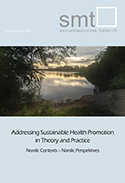Abstract
The purpose of this article is to explore how two different versions of participatory theatre give
marginalized citizens living in disadvantaged areas an opposite basis for sharing experiences of being judged in communication with their GPs.
The data were produced as part of a dialogic evaluation of two health communication interventions initiated by Region Zealand, Denmark. The purpose of both interventions was to invite citizens to participate in a dialogue on their experiences with their GPs, initiated through two versions of participatory theatre. The interventions were held in a range of disadvantaged areas. We used a variety of qualitative approaches such as participant observations, focus interviews and individual interviews in order to shed light on a) how the two versions of participatory theatre were developed and b) how the invitation to have a dialogue was experienced by the citizens.
The analysis was conducted abductively, moving between the data production, existing research on inequality in access to health care services and theories on social inequality and its moral implications.
Theoretically, we employ Bernstein´s concept of framing, Skeggs´ points about class as a relation between moral judges and judged, and perspectives on healthism, risk and responsibilization.
The analysis finds that the first version of participatory theatre frames the judge-judged relation as the problem, enabling the participating citizens to share experiences of being judged as morally inferior. The framing of the second version of participatory theatre however implies the judge-judged relation, whereby the participants feel that they are being judged. As a consequence, the participants dis-identify with the role of the patient in the second version and express resentment towards health institutions.
We conclude by suggesting that framing is a central perspective when researchers and health professionals wish to initiate dialogue with marginalized citizens and that the class perspective presented here is fruitful in exploring experiences of social inequality in access to health care.
Författare som medverkar i Socialmedicinsk tidskrift accepterar att deras verk publiceras under licensen Creative Commons Attribution-NonCommercial 3.0 Unported. Denna licens tillåter att en tredje person delar ut författarens arbete (kopierar, distribuerar och sänder verket) och skapar bearbetningar av det under förutsättning att: författaren/na och/eller licensgivaren anges på ett korrekt sätt, verket inte används i kommersiellt syfte samt om verket återanvänds eller distribueras måste information tydligt anges om upphovsrättsvillkoren som gäller för verket.
Författare behåller upphovsrätt för deras arbete men garanterar samtidigt publiceringsrättigheter för första publicering och all publicering via Internet till Socialmedicinsk tidskrift. Vidare kräver Socialmedicinsk tidskrift att författaren överför samtliga upphovsrättigheter för kommersiell användning av verket till utgivaren (Socialmedicinsk tidskrift). Inkomster från kommersiell försäljning används för att kunna fortsätta att publicera smt både i tryckt format och online utan publiceringsavgifter.
